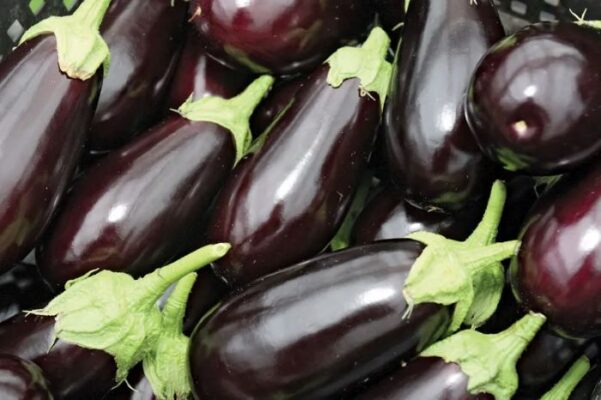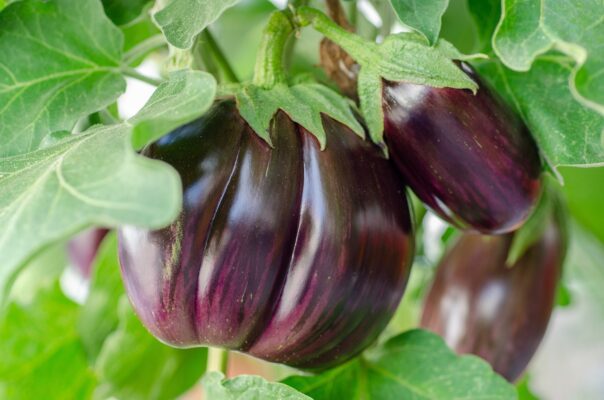Eggplant is a popular vegetable in many cuisines, but do you know what plants to pair it with? Growing companion plants alongside your eggplant can help improve the soil’s health, prevent pests, and even improve yields.
In this blog post, we’ll look at some of the best companion plants for eggplant so that you can have a thriving and productive garden.
Table of Contents
What Is Eggplant?

Eggplant is a warm-season vegetable that belongs to the nightshade family. It is commonly grown for its edible fruit, which can range in colour from white to dark purple and have either smooth or bumpy skin.
Eggplant is a versatile vegetable that can be grilled, baked, steamed, or stir-fried and used in various dishes. It is high in fibre and has many health benefits, including helping reduce blood cholesterol levels, improving digestion, and providing essential vitamins and minerals.
What Is Companion Planting?
Companion planting is a method of growing different plants together that can benefit each other in various ways, such as by repelling pests, improving soil health, or providing shade. For example, planting marigolds near tomatoes can help deter tomato hornworms, while planting beans near corn can deliver the beans with a structure to climb on.
Companion planting is often used in organic and sustainable gardening as an alternative to chemical pesticides and fertilizers.
Why Do I Need Companion Plants to grow Eggplants?
Companion planting can be beneficial for eggplants because certain plants can repel pests or attract beneficial insects that can protect the eggplants from damage.
Additionally, some companion plants can improve the soil quality or provide shade for the eggplants, which can help them grow more vigorously. Some examples of eggplant companion plants include marigolds, nasturtiums, and basil.
Many Plants to Grow with Eggplant
Eggplants, also known as aubergines, can benefit from companion planting, which involves planting certain plants nearby to enhance growth, deter pests, and improve overall garden health. Here are some companion plants that are commonly recommended to grow alongside eggplants:
- Basil: Basil is a popular companion plant for eggplants. It can enhance the flavor of eggplants while repelling pests like aphids, spider mites, and mosquitoes.
- Marigolds: Marigolds are known for their pest-repellent properties. They can deter aphids, nematodes, and other harmful insects that might affect eggplants.
- Tarragon: Tarragon is said to improve the flavor of eggplants when planted nearby. It also attracts beneficial insects like ladybugs and predatory wasps that can help control pests.
- Beans: Beans, particularly bush beans, can be beneficial for eggplants. They are nitrogen-fixing plants, which means they help replenish the soil with nitrogen, benefiting the growth of nearby plants like eggplants.
- Peppers: Peppers, such as hot peppers or bell peppers, are often recommended as companion plants for eggplants. They have similar growing requirements and can help deter pests like aphids and flea beetles.
- Nasturtiums: Nasturtiums are known for their ability to repel aphids, whiteflies, and squash bugs. They also attract beneficial insects like bees and predatory insects, which can help control pests.
- Catnip: Catnip is a member of the mint family and can help repel flea beetles, aphids, and other insect pests that may attack eggplants.
- Spinach: Spinach can provide some shade to eggplant plants, especially during the hot summer months. It also has a similar growth habit, making it a suitable companion.
- Thyme: Thyme is a fragrant herb that can help repel cabbage worms, which can be a nuisance for eggplants and other members of the nightshade family.
- Onions and garlic: Onions and garlic have natural pest-repellent properties and can help deter aphids, flea beetles, and other pests that might affect eggplants.
- Parsley: Parsley can attract beneficial insects like hoverflies and predatory wasps, which can help control pests that may affect eggplants.
- Oregano: Oregano has aromatic properties that can repel pests like aphids and spider mites. It also attracts pollinators to the garden.
- Mint: Mint plants can deter aphids, flea beetles, and ants, which are common pests that may damage eggplants.
- Chives: Chives have insect-repellent properties and can help deter pests like aphids and Japanese beetles.
- Cabbage family plants: Some members of the cabbage family, such as broccoli, cauliflower, and kale, can be compatible with eggplants. They have different growth habits and can help provide some shade and wind protection.
- Cilantro: Cilantro can attract beneficial insects, including parasitic wasps, which can help control pests that may attack eggplants.
- Carrots: Carrots can be planted alongside eggplants as they have shallow roots that won’t compete for nutrients with the deeper-rooted eggplants. They also attract beneficial insects.
- Borage: Borage is an excellent companion plant that attracts pollinators and repels harmful insects like tomato hornworms and cabbage worms.
- Radishes: Radishes can help deter flea beetles and other pests that might affect eggplants. They also help break up the soil and improve its structure.
- Sunflowers: Tall sunflowers can provide shade and wind protection to eggplants, and their bright flowers attract pollinators.
Remember to consider the specific growing conditions, climate, and pests in your area when selecting companion plants for your eggplants. Each garden is unique, so it’s a good idea to experiment and observe the interactions between plants to determine which combinations work best for you.
What Are the Benefits of Companion Planting?
Companion planting is the practice of growing different types of plants together nearby for mutual benefit. Some of the benefits of companion planting include:
- Pest control:Certain plants can act as natural repellents for pests, helping to protect nearby plants from damage.
- Soil improvement:Some plants, such as legumes, can fix nitrogen in the soil, making it more fertile for other plants.
- Disease control:Companion plants can help prevent disease spread by increasing air circulation and reducing humidity around the plants.
- Improved growth:Some plants can provide shade or support for others, helping them to grow better.
- Increased yield:Companion planting can increase output as plants grow better in a mutually beneficial environment.
Frequently Asked Question
-
Bad companion plants for eggplant?
Some bad companion plants for eggplant include tomatoes, peppers, and potatoes. These plants are all members of the nightshade family and can attract pests and diseases that can harm eggplant. Additionally, eggplants can also inhibit the growth of these plants. Other plants that should be avoided as companion plants for eggplants include fennel, dill, and rue.
-
What are good companion plants for eggplant?
Companion plants that are known to have a positive effect when planted near eggplant include:
- Tomatoesprovide natural shade for the eggplant and can repel pests that may harm the eggplant.
- Peppers:They also provide natural shade and repel pests.
- Marigoldsemit a strong smell that repels pests and can improve the growth and flavour of the eggplant.
- Basil:It can repel pests and improve the flavour of the eggplant.
- Nasturtiums: They attract beneficial insects that can help control pests.
- Garlic, Onions, and Leeks:They can repel pests and improve the growth and flavour of the eggplant.
It’s important to note that some plants may inhibit the growth of eggplants; for example, nightshades such as potatoes, tomatoes, peppers, and eggplant should not be planted near each other.
Conclusion
Eggplants are a great addition to any garden; they grow best when planted with other companion plants. Tomatoes, peppers, basil, marigolds, and nasturtiums are all great options for increasing alongside your eggplants.
These companion plants provide extra nutrients to the soil, can help to prevent certain pests, and can even give your eggplants a boost in flavour.
No matter what companion plants you choose, you’ll indeed have a successful eggplant harvest if you follow some basic growing guidelines. So get out there and get planting!


Useful info. Lucky me I found your site by accident, and I
am shocked why this twist of fate didn’t happened earlier!
I bookmarked it.
Just wish to say your article is as astonishing. The clearness in your post is just spectacular and i can assume you are an expert on this subject.
Well with your permission let me to grab your feed to keep updated with forthcoming
post. Thanks a million and please keep up the rewarding
work.